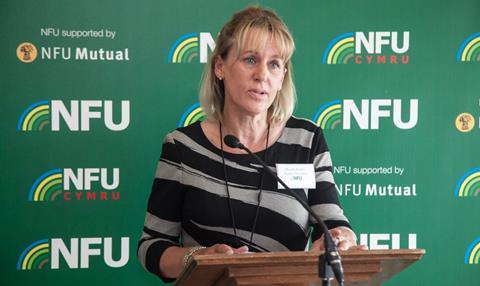Ahead of the next general election, the National Farmers' Union (NFU) has urged all political parties to support policies which back British food and farming in its newly published manifesto.

Research conducted by More in Common and commissioned by the NFU leads the manifesto, with the NFU stating that is "demonstrates how much food and farming matters to voters in the run up to the general election". A total of 2,135 adults were surveyed between 14th and 16th October 2023, finding "strong appetite" for Government support of British food.
The research showed that:
- 84% of respondents think food production targets are either as important or more important than environmental targets for farming
- 82% say it would be a good idea for the Government to set targets to increase British food production.
- 66% think that the parties’ plans on farming will be one of the issues that affects who they vote for at the next general election
- 66% think that a commitment to a long-term plan for food and farming will be an important factor in who they vote for at the next election.
A key ask outlined within the manifesto calls on the next Government to match the existing target-led ambitions for the environment and climate mitigation with similar ambitions for Britain’s food security, by also setting targets for food production.
The manifesto calls on Government to match existing target led ambitions for the environment and climate mitigation by setting targets for food production.
President of the NFU Minette Batters said: “All our research shows that the British people really value our farmers and growers for the work they do day-in, day-out to feed the nation. Their support has been vital during the turbulence of the past few years with the Covid pandemic, the war in Ukraine, the cost-of-living crisis and increasing periods of drought and flooding.
“Shoppers want to be able to go into a supermarket and have the option to buy quality, high-welfare, environmentally-friendly food and we know the availability and affordability of food is high on people’s minds. But with food production under increasing pressure – not least from record production costs and the biggest shake up in agricultural policy since 1947 – we need policies in place that support British farming, with all Whitehall departments developing policy through the lens of food production.”
Batters said: “We know that the rural vote will be important in this election, but it’s clear that across the country, people living in towns and cities also want to know how parties plan to boost sustainable, home-grown food production as well as care for the environment and tackle climate change. And our data shows it will influence who they vote for at the ballot box.
“As a country, there are multiple priorities and challenges, and this manifesto shows that food security must be one of them, with our farm businesses supported to invest and grow for the benefit of everyone.
“We must not fall into the trap that we can simply import our food needs from other countries – we’ve seen that approach fail before with empty supermarket shelves and we know there is strong public opinion against importing food from elsewhere produced in ways that would be illegal here. That’s why we are asking for targets for British food production, just as the Government has rightly legislated for targets on the environment, green energy and climate change. Food has to be given the same status.
“Alongside producing fantastic food, we are the custodians of our iconic countryside and farm businesses are often the beating heart of rural communities. We provide jobs for more than four million people and contribute billions to the economy. Add that to green, renewable fuel, natural fibre and a vibrant flower-growing sector, British farmers deliver so much for the nation."
Batters concluded: "What farmers, growers and the public need now is to see practical and progressive policies coming from all political parties which are investing in a future where British food and farming can thrive.”
The manifesto can be viewed here.
This story was originally published on a previous version of the Meat Management website and so there may be some missing images and formatting issues.
















